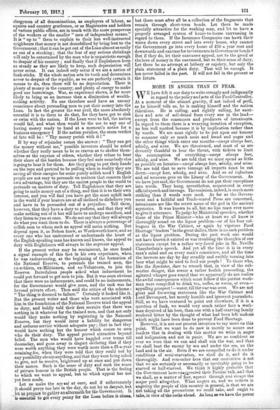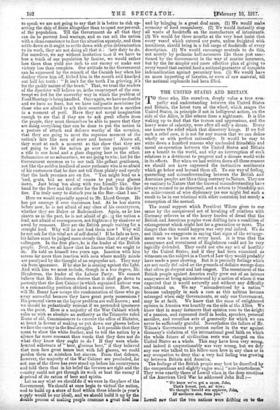MORE IN ANGER THAN DT FEAR.
VVE have felt it our duty to write strongly and indignantly in regard to the policy and acts of the Food Controller. At a moment of the utmost gravity, if not indeed of peril, as he himself tells us, he is making himself and the nation ridiculous. He is calling, and rightly calling, for sacri- fices and acts of self-denial from every one in the land— except from the consumers and producers of intoxicants. In regard to them there is a wearying iteration of exception, no less well marked because it is by implication rather than by words. We are most rightly to be put upon our honour to consume only so much meat and bread and sugar and the other things which enter our mouths—except always beer, whisky, and wine. We arc threatened, and most of us are devoutly thankful to hear the threat, with tickets to limit the consumption of everything—except always beer, whisk', and wine. We are told that we must spend as little as possible on luxuries—except always beer, whisky, and wine. We are told that to save tonnage all imports must be cut down—except beer, whisky, and wine. And so ad infinitum and ad nauseam goes on the Litany of the Government. As we have just said, the Government do not put their exceptions into words. They hang, nevertheless, sequestered in every official speech and message. The omission, indeed, is much more striking than if words were used. As far as the Govern- ment and a faithful' and Trade-seared Press are concerned, intoxicants are like the secret name of the god in the ancient mysteries. It was known to all, but no lips must ever move to give it utterance. To judge by Ministerial speeches, whether those of the Prime Minister—who at heart we all know is thoroughly sound on the liquor problem—or of his four col- leagues in the War Cabinet, or again by vigorous Food Shortage "leaders "in the great dailies, there is no such problem as the liquor problem. During the past week one would not have known it existed or was troubling the thoughts of our statesmen except for a rather wry-faced joke in Mr. Neville Chamberlain's speech. And yet all the time it is in every man's mind and on every man's conscience, and all the time the brewers are day by day steadily and swiftly turning into beer what might be used to feed our people To those who, like the Spectator, dare to remark that, in view of the sub- marine danger, this seems a rather foolish proceeding, the agitated whisper goes round that we apparently do not realize the awful consequences which must follow if the patriot work- man were compelled to drink tea, coffee, or cocoa, or even— appalling prospect !—water, till the war was over. We are not great and far-seeing statesmen like the War Cabinet and Lord Devonport, but merely humble and ignorant journalists. Still, as we have ventured to point out elsewhere, if it is a question of funk, we would very much rather face a work- man deprived of his beer, than one with a half-starving family rendered bitter by the thought of what had been left undone which might have been done to prevent Food Shortage.
HoweVer, it is not our present intention to say more on this point. What we want to do now is merely to assure our readers that in dealing with this matter we write in anger and indignation and not in panic. We are as confident as ever we were that we can and shall win the war, and that we shall beat the enemy by sea and under the sea, on the land and in the air. Even if we are compelled to do it under conditions of semi-starvation, we shall do it, and do it thoroughly. And remember here that our contention is not that we are certainly or necessarily or inevitably going to bo starved or half-starved. We think it highly probable that the Government have exaggerated their Famine talk, and that we shall, as a matter of fact, squeak through and escape the major peril altogether. What angers us, and we believe is angering the people of this country in general. is that we are not taking all the precautions we could take, and ought to take.in view of the.roc.ks ahead. As long as we have the power to speak we are not going to say that it is better to risk up- setting the ship of State altogether than to upset one per cent. of the population. Till the Government do all that they can do to prevent food wastage, and so can ask the nation with a clean conscience to face the situation sparely, and then settle down as it ought to settle down with grim determination to its work, they are not doing all that it i their duty to do. For ourselves, we say without hesitation teat if we have to lose a tenth of our population by famine, we would rather lose them than yield one inch to our enemy or make our victory less than complete. Our attitude to the Government can be expressed by the remark of the Cornish boy when his donkey threw him off, kicked him in the mouth and knocked out half his teeth : " It isn't for the teeth I'm grieving, it's for the gashly nature of the-beast." That, we trust the readers of the Spectator will believe us, is the counterpart of the con- tempt we feel for the unworthy way in which the problem of Food Shortage is being handled. Once aeain, we have no doubts and we have no fears, but we have aligniaio saevissima for those who are afraid to ask their countrymen for a sacrifice in a moment of peril. Have they not moral imagination enough to see that if they are to ask great efforts from the people, they must themselves be able to-prove that they are doing everything that can be done to put the nation in a posture of attack and defence worthy of the occasion, that they are going to meet the supreme moment of the nation's fate like men of sense and honour ? Above all, they must at such a moment as this show that they are not going to let the nation go over the parapet with a rifle in one hand and a glass slopping beer in the other. Submarines or no submarines, we are going to win ; but let the Government summon us to our task like gallant gentlemen, net like the sodden landlord of some pothouse who is so afraid of his customers that he dare not tell them plainly and openly that the back premises are on fire. " You might lend us a 'and, gents, but no need of course to put your glasses down. Just bring 'em along with you friendly like. One hind for the Beer and the other for the Bucket 'II do this fire fine. I'm truly sorry to disturb you in the Bar—that I am."
Here we would especially appeal to Mr. Lloyd George. Ho has got courage if ever statesman had. As he has shown before now, ho is not afraid of any class of his countrymen, whether they are Dukes or Boilermakers. Again, as he has shown us in the past, lie is not afraid of gie ig the nation a lead, not afraid of consequences, not frightened by shadows or awed by rumours. Here are the British people waiting for a straight lead.- Why will he not lead them now ? Why will ho not ask for this vital act of self-denial ? If he fails us here, his failure must he judged more sternly than that of any of his colleagues. In the first place, he is the leader of the British people. Next, we all know that he knows what we ought to do. He told us himself two years ago. Inaction with him means far more than inaction with men whose muddy minds are paralysed by the thought of an unpopular act. They may sin from ignorance. If he -sins he is sinning against the light. And with him we must include, though in a less degree, Henderson, the leader of the Labour Party. We cannot believe that Mr. Henderson desires that it shall go down to posterity that the first Cabinet in which organized Labour was in a commanding position shirked a moral issue. How, too, will Mr. Boner Law escape the condemnation of those who go away sorrowful because they have great party possessions ? His personal views on the liquor problem are well known ; and wo should be pedantically reticent if we pretended ignorance on the point. Here is a majority of the War Cabinet which rules us with as absolute an authority as the Triumvirs ruled Rome of old, Commissioners to execute the office of Dictator, at heart in favour of makine° us put down our glasses before we face the enemy in the final struggle. Is it possible that they mean to show the white feather, and to tell the nation by a silence far more resonant than words that they dare not do what they know they ought to do ? If they were whole- hearted adherents of beer, glorious beer," if they believed that men face great issues best with full glasses, we could pardon them as mistaken but sincere. From that defence, however, the majority of the War Cabinet are precluded, for not cam of th.e three has ever stood up before his countrymen and told, them that in his belief the brewers are right and the country could not get through its work or beat the enemy if deprived of its ration of beer and spirits. Let us say what we should do if we were in, the place of the Government. We should at once begin to victual the nation, and to build up a store of food within these islands (a year's supply would be our ideal), and we should build it up by the Rouble process of making people consume a great deal leas and by Waging in a great.deal more. (I) We would make economy of food oompulsory. (2) We would instantly stop all waste of foodstuffs on the manufacture of intoxicant's. (3) We would for three months at the very least insist that every vessel which entered our ports, unless freighted with munitions, should bring in a full cargo of foodstuffs of every description. (I) We would encourage neutrals to do this not merely by pedantic half-measures like those lust sanc- tioned by the Government in the way of marine insurance, but by the far simpler and more effective plan of giving to every vessel that carried food a national guarantee of complete indemnification against pecuniary loss. (5). We would have no more importing of luxuries, or even of raw material, till the national cupboards had been filled.



































 Previous page
Previous page